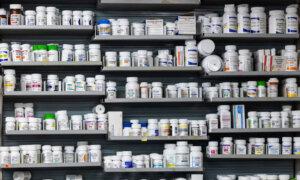The ‘Most Favored Nation’ plan will reduce U.S. prices by up to 80 percent, the president said.
President Donald Trump announced a plan to lower prescription drug prices in the United States by up to 80 percent.
The president signed the Most Favored Nation Drug Pricing executive order at the White House on May 12.
The plan requires drug makers to offer the lowest price found in other developed countries for certain high-cost prescription medications.
“The United States will no longer subsidize the health care of foreign countries,“ Trump said before signing the executive order. ”And we will no longer tolerate profiteering and price gouging from Big Pharma.”
The concept has bipartisan congressional support but is likely to face strong opposition from drug manufacturers and free-market advocates. They say it will create shortages and undercut funding for developing new medications.
Trump dismissed those concerns, saying the policy would force other developed countries to pay their fair share for prescription drugs, providing adequate profit for manufacturers to reinvest in research and development.
Americans pay higher prices for prescription drugs than any nation in the world, according to a 2024 report from the Department of Health and Human Services.
The United States has less than 4 percent of the world’s population but accounts for more than two-thirds of global pharmaceutical profits, according to Trump.
“American patients were effectively subsidizing socialist healthcare systems in ... all parts of the European Union,” Trump said.
The plan would result in higher drug prices in other countries so that drug makers’ profits would remain about the same, enabling them to continue investing in research and development, Trump said.
The order reinstates a similar trial program that Trump instituted in 2020.
The policy directs the health secretary to facilitate direct-to-consumer sales when appropriate, ensuring that manufacturer discounts are passed on to consumers rather than benefiting intermediaries.
At the same time, Trump said the United States would assist pharmaceutical companies in negotiations with other countries, which sometimes dictate pricing to the manufacturers.
Health Secretary Robert F. Kennedy Jr. credited Trump for taking on the pharmaceutical lobby, which he called the most powerful in the country.
“This was an issue that people talked about. Nobody wanted to do anything because it was radioactive. They knew you couldn’t get it by Congress. We now have a president who is a man of his word,” Kennedy said.
Dr. Mehmet Oz, administrator of the Centers for Medicare and Medicaid Services, predicted “withering criticism and lobbying” following the announcement.
Oz pointed out that Americans pay much higher prices than in other countries, even for drugs whose prices were lowered under the Inflation Reduction Act.
Dr. Martin Makary, commissioner of the Food and Drug Administration, called the new policy “transformative.”
“The fundamental problem in healthcare is that we’ve had non-competitive markets,” he said.
This is a developing story and will be updated.

 1 month ago
3
1 month ago
3










 English (US) ·
English (US) ·